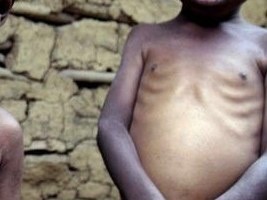|
||||||||||||||||||
| Download the revised decree and electoral calendar, published in the official journal |
|
|
Haiti - FLASH : The hour is serious, 19,000 Haitians affected by famine, 4.7 million in food insecurity 13/12/2022 08:48:46
According to the latest report from the National Food Security Coordination (CNSA), there are approximately 4.7 million people in a situation of food insecurity, which represents nearly half of the population of Haiti. During the period from September 2022 to February 2023, 19,000 people are classified in IPC phase 5 (famine/humanitarian crisis https://www.haitilibre.com/en/news-37997-haiti-crisis-more-than-18-of-the-population-at-risk-of-very-high-malnutrition.html ) 18% of the population analyzed (approximately 1.8 million people) are classified in phase 4 of the IPC (Humanitarian emergency) 29% (about 2.9 million people) in phase 3 (acute food crisis and livelihoods) For the projected period, from March to June 2023, for which no humanitarian food assistance has been confirmed, people in Phase 5 are confirmed. 17% of the analyzed population (approximately 1.65 million people) will be in IPC phase 4, 30% (approximately 3 million people) in IPC phase 3, in need of urgent action to the projection period. The CNSA classifies cities affected by food insecurity by priority zone in order to direct humanitarian actors to the most urgent cases. Priority 1 areas : These are areas classified as an emergency situation with more than 50% of the population in phase 3 or more according to the integrated food security classification framework. Some towns concerned: Haut-Plateau ; Cité-Soleil ; Grand-Anse (rural) ; Anse à Veau ; Miragoâne ; Petite Rivière des Nippes ; Arnaud ; Petit Trou des Nippes ; Ennery ; Gros-Morne ; Marmelade ; Saint-Michel de l’Attalaye ; La Tortue ; Anse-à-Foleur ; Chansolme ; Port-de-Paix ; Saint-Louis du Nord ; La Gonave ; Arniquet, Chardonnières, Coteaux, Ile à Vache, Les Anglais, Port à Piment, Port Salut, Roche à Bateau, Saint-Jean du Sud, Tiburon... Priority 2 areas: These are areas classified as in an emergency situation with less than 50% of the population in phase 3 or more. The areas concerned are the poorest neighborhoods of Port-au-Prince and Croix-des-Bouquets; Belle Anse; Grand-Gosier, Thiotte… Households in these areas have suffered an extreme loss of livelihood assets, particularly in terms of short-term food consumption, which increases the rate of acute malnutrition. In terms of support, less than 700,000 people representing 7% of the population analyzed were able to benefit from emergency food assistance in the form of a ration or cash transfer. Download the report : https://www.haitilibre.com/docs/IPC_Haiti_Acute_Food_Insecurity_22Sept_23Jun_Snapshot_French%20(1).pdf Determinants of food insecurity: Gang Violence: limiting the movement of goods and people Economic shock: GDP deceleration and sustained inflation Low agricultural production: due to below-normal rainfall and household decapitalization Earthquake of August 14, 2021: ongoing recovery of populations affected by the 7.2 magnitude earthquake in the southern peninsula CNSA Recommendations: 1 - Emergency interventions to reach households in areas classified in phase 4 of the IPC as well as those in disaster situations (phase 5); 2 - Support for livelihoods to support affected populations in order to rebuild and develop their livelihoods by providing them with agricultural inputs and credit; 3 - Articulation between emergency and development in order to have more lasting effects during humanitarian interventions during this crisis situation. In short, these 4.7 million people are in great need of humanitarian assistance. All social strata of the Haitian population can contribute, in particular the private business sector and civil society. In this sense, AGERCA encourages coordination with national partners with the aim of carrying out interventions and continuing to support these affected people as they go along, while highlighting the long-term impacts. IPC scale (Integrated food security Phase Classification): Phase 1 : Usually adequate and stable food access with moderate to low risk of sliding into Phase 3, 4, or 5. Phase 2 : Moderately / Borderline Food Insecure Borderline adequate food access with recurrent high risk (due to probable hazard events and high vulnerability) of sliding into Phase 3, 4, or 5. Phase 3 : Acute Food and Livelihood Crisis Highly stressed and critical lack of food access with high and above usual malnutrition and accelerated depletion of livelihood assets that, if continued, will slide the population into Phase 4 or 5 and / or likely result in chronic poverty. Phase 4 : Humanitarian Emergency Severe lack of food access with excess mortality, very high and increasing malnutrition, and irreversible livelihood asset stripping. Phase 5 : Famine / Humanitarian Catastrophe Extreme social upheaval with complete lack of food access and / or other basic needs where mass starvation, death, and displacement are evident. HL/ S/ HaitiLibre
|
|
|
Why HaitiLibre ? |
Contact us |
Français
Copyright © 2010 - 2026 Haitilibre.com |





